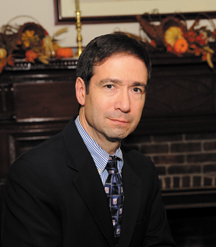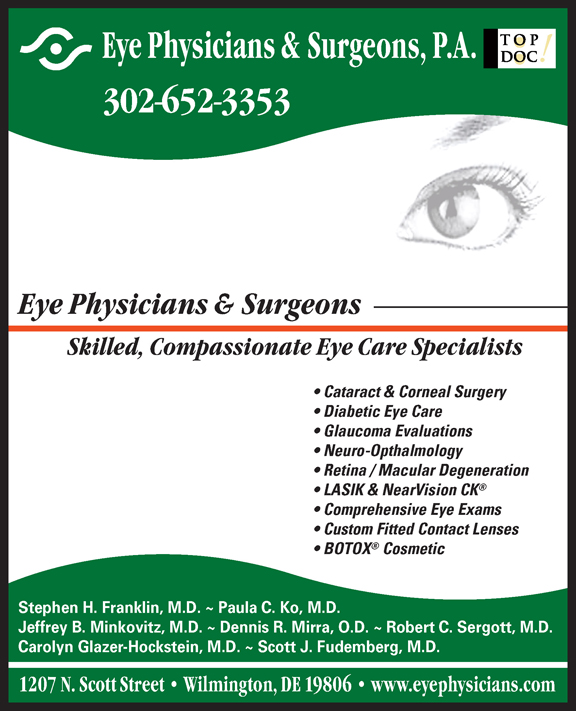Dr. Jeffrey Minkovitz Brings The Latest Advances In Eye Surgery To Delaware
 By Jeffrey B. Minkovitz, M.D.
By Jeffrey B. Minkovitz, M.D.
The field of Ophthalmology over time has provided wonderful opportunities to improve patients’ health and well being. The confluence of medicine and technology in our era has spawned numerous innovations which have revolutionized eye care. These advancements have dramatically improved outcomes for patients, at a pace never before experienced. While previous standards strived for visual rehabilitation, now vision enhancement, comfort, and rapid recovery are the new benchmarks.
Technology has played a key role in the progress of all of medicine, but in few areas are these advances as dramatic as they are in ophthalmology. Several key areas are noteworthy: cataract and corneal surgery, refractive surgery, diagnostic testing, and medical therapies for glaucoma and macular degeneration.
Cataract surgery dates to the 5th century BC when early practitioners pushed cloudy lenses aside. It wasn’t until the 1700s that cataracts were actually removed, and not until the 1940s that intra-ocular lenses were first implanted. Now, high quality implants improve vision to levels often better than ever, and may correct astigmatism and improve reading and distance vision, reducing the need for glasses. Newer, safer machines aid in the removal of cataracts, and now laser cataract surgery is on the horizon.
Corneal transplantation has been successfully performed since the 1950s, but recent developments in the last decade have made tremendous improvements both in visual success and transplant survival. DSAEK and DALK are two very new, less invasive procedures, which are now available
in Delaware.
Refractive surgery, and in particular laser vision correction, is perhaps one of the most “high profile” advancements in ophthalmology. Combining laser precision, rapid recovery, and desirable results, laser vision correction has allowed millions of patients to reduce their need for glasses. Available since FDA approval in 1995, the procedure has evolved and become safer and more accurate and effective.
Finally, new diagnostic instruments, incorporating the latest technology in high resolution scanning and computer analysis have allowed better monitoring and treatment of diseases. New medications have allowed ophthalmologists to arrest the progression of vision stealing glaucoma and macular degeneration, two devastating diseases which are the leading causes of blindness in the United States.
This is truly an exciting time to practice medicine, and Ophthalmology, in particular. Patients can now look forward to preserving, and even enhancing, their vision, where previously there may have been limited success.
Jeffrey Minkovitz, MD is an ophthalmologist with Eye Physicians and Surgeons in Wilmington, Delaware. Dr. Minkovitz specializes in cataract and refractive surgery, and is one of only a few Delaware surgeons specially trained in corneal transplantation. He completed a cornea and refractive surgery fellowship at the renowned Wilmer Eye Institute of Johns Hopkins. Previously, he graduated magna cum-laude from Harvard, earned his medical degree from the University of Massachusetts, completed internship at Harvard’s Mt. Auburn Hospital, and served his ophthalmology residency at Washington University.
Dr. Minkovitz participated in the early research on Excimer Laser refractive surgery, and has offered this procedure to Delawareans since FDA approval in 1996, before Delaware had its own laser. These early pioneering individuals travelled to Wilmer Institute with Dr. Minkovitz, where he maintained his teaching and clinical appointment. In addition to introducing laser vision correction to Delaware, he also introduced NearVision CK to eliminate reading glasses, DSAEK (a newer, less invasive type of corneal transplant) and most recently the newest advance: laser cataract surgery.
Dr. Minkovitz is a co-founder of the Center for Advanced Surgical Arts and serves on its medical advisory board. He is also on active staff at Christiana Care. While on staff of Wilmer at Johns Hopkins University, Dr. Minkovitz received the Outstanding Teacher award. He was also named Top Doc in ophthalmology by Delaware Today Magazine six consecutive years, and has been an invited instructor at American Academy of Ophthalmology Annual Meetings.
For further information or to schedule an appointment please call 302-656-2020 extension 1.
“New advances in the CK technique, called light touch, produce more effective and predictable results.”
CK® Testimonial…
It finally occurred to me what has been missing during the last 2 days. Since Richard’s surgery, he isn’t complaining about his inability to read something on the fly without searching for his glasses. He wired 6 recessed lights (NO GLASSES), he read the Sunday paper sections A & B and menus (NO GLASSES), and is using the computer (NO GLASSES). I suppose for Richard, needing to look for glasses when he wanted to see something, has been the hardest adjustment of becoming older. His dependence was so gradual that I never related to why he would get so angry over needing them. My house has been quieter. I now have 2 less things to do everyday: find the glasses and make sure they were clean!


